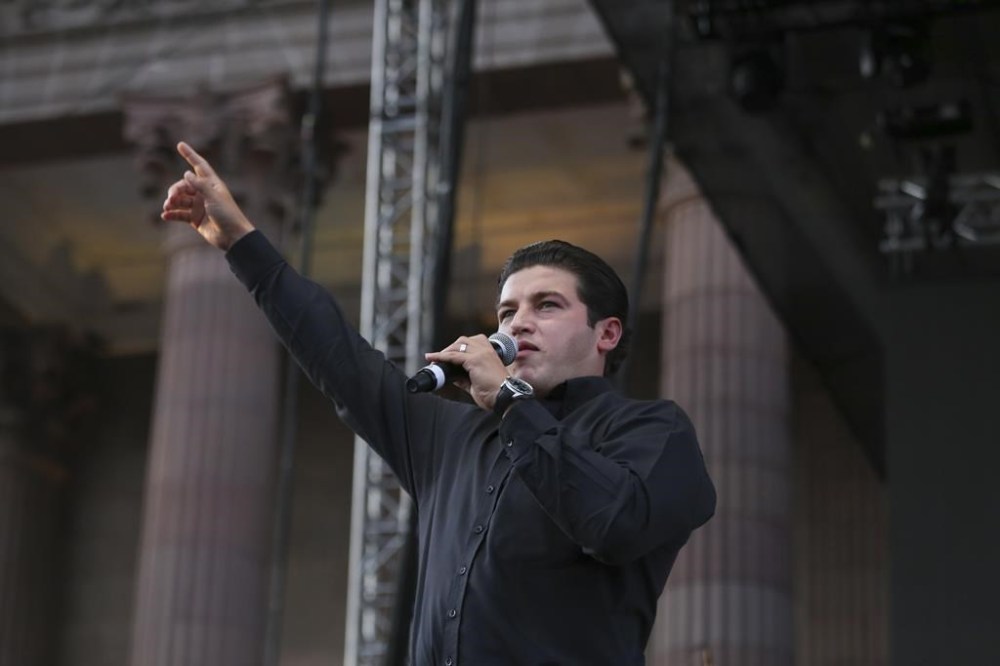Third-party candidate leaves Mexico’s 2024 presidential race. Next leader now likely to be a woman
Advertisement
Read this article for free:
or
Already have an account? Log in here »
To continue reading, please subscribe:
Monthly Digital Subscription
$0 for the first 4 weeks*
- Enjoy unlimited reading on winnipegfreepress.com
- Read the E-Edition, our digital replica newspaper
- Access News Break, our award-winning app
- Play interactive puzzles
*No charge for 4 weeks then price increases to the regular rate of $19.95 plus GST every four weeks. Offer available to new and qualified returning subscribers only. Cancel any time.
Monthly Digital Subscription
$4.99/week*
- Enjoy unlimited reading on winnipegfreepress.com
- Read the E-Edition, our digital replica newspaper
- Access News Break, our award-winning app
- Play interactive puzzles
*Billed as $19.95 plus GST every four weeks. Cancel any time.
To continue reading, please subscribe:
Add Free Press access to your Brandon Sun subscription for only an additional
$1 for the first 4 weeks*
*Your next subscription payment will increase by $1.00 and you will be charged $16.99 plus GST for four weeks. After four weeks, your payment will increase to $23.99 plus GST every four weeks.
Read unlimited articles for free today:
or
Already have an account? Log in here »
Hey there, time traveller!
This article was published 02/12/2023 (772 days ago), so information in it may no longer be current.
MEXICO CITY (AP) — A third-party candidate announced Saturday he is leaving Mexico’s 2024 presidential race, practically ensuring the country ’s next president will be a woman.
Samuel García, the governor of the northern border state of Nuevo Leon, said Saturday he won’t run for president in the June 2 elections. He had been polling below 10% in the race, and was given almost no chance of actually winning.
That leaves only the ruling Morena party and the opposition coalition’s candidates, both of whom are women. While García’s small Citizen’s Movement party could yet nominate another male candidate, García’s troubled exit suggests the party won’t be able to find anyone of much stature to run.

Gov. García’s decision came after one of the wilder chapters in Mexican politics. On Friday, the border state across from Texas briefly saw two interim governors designated to replace García, who had asked for a six-month leave of absence to campaign for president.
Mexican law requires any official to resign or take a leave at least six months before running for office. With the presidential elections on June 2, that meant Friday was the last day for García to do so. But in view of the conflict, García had to drop his presidential bid to put his state in order.
García had appointed one of his Cabinet members to serve as interim governor, and he was supposed to take over the job on Friday. But the state congress, where García’s party is a minority, has the formal right to name the interim governor and chose an assistant prosecutor who isn’t linked to García’s party.
Angered by that decision, protesters apparently linked to García broke through doors of the state legislature building, took over the floor of the state congress and launched a smoke bomb.
The standoff — which also featured riot police and armored vehicles posted outside the governor’s office at one point Friday — led García to announce he was abandoning his leave of absence and resuming his job as governor.
“Ï have decided not to participate in the campaign for president,” García wrote in a decree announcing his decision.
García’s decision will almost certainly be a disappointment for President Andrés Manuel López Obrador. López Obrador had openly expressed sympathy for García, whose Citizen’s Movement party has been a sometimes ally of the president’s Morena party.
López Obrador claims his sympathy for García stemmed from supposed attempts to keep the governor from running, which the president said paralleled his own experience in 2005 and 2006, when a court briefly stripped him of his right to hold office.
But critics say López Obrador was encouraging García’s doomed candidacy — as Mexican ruling parties have done frequently in the past — as a way to split the opposition vote.
Nuevo Leon, across the border from Texas, is an important industrial hub and García, 35, had hoped his youthful, social media-savvy campaign style would attract younger voters,
Since he took office in 2021, García has faced a severe water crisis that left much of Monterrey, the state capital, without service for weeks. He has also bragged about his friendship with Elon Musk, and has touted hopes that a Tesla plant will be built in his state.

